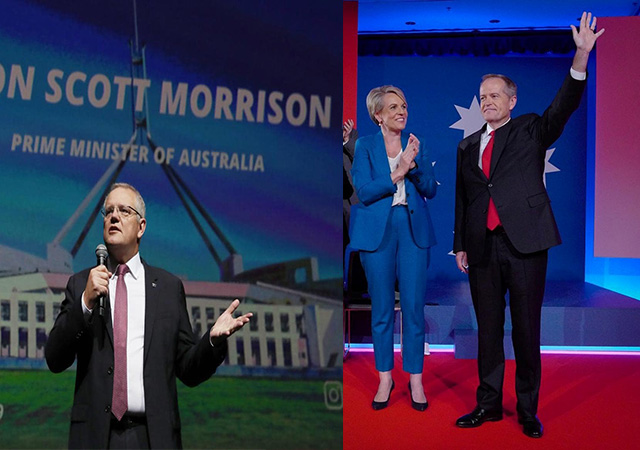 "One of the most salient features may simply have been both leaders’ unpopularity" - Scott Morrisson (l) and Bill Shorten (r) on Facebook.
"One of the most salient features may simply have been both leaders’ unpopularity" - Scott Morrisson (l) and Bill Shorten (r) on Facebook.
In a result that probably surprised the parties as much as the pundits, the Liberal-National Party (LNP) coalition, led by Scott Morrison, was returned to power on 18 May. The LNP gained six seats to win 77 overall to 68 for the Australian Labor Party (ALP), under Bill Shorten, which gained one. Smaller parties won six seats.
A notable result was in the conservative heartland of Warringah, New South Wales, where the former Liberal prime minister Tony Abbott was swept out of office on an 18% swing. It was a rare case of the environment being a key issue, with his upstart challenger, Zali Steggall, a lawyer and former Olympic skier, campaigning on climate policy.
In most seats, however, voters defied predictions that it would be Australia’s ‘climate election’ – Kelly Albion, of the Australian Youth Climate Coalition, being one of many to assert that it would be the ‘number-one issue’. In fact, both major parties skirted the crisis, despite Australia being ‘the most vulnerable nation in the developed world’, according to climate scientist Dr Joëlle Gergis, as seen in devastating floods that followed five years of drought, killing 500,000 cattle in Queensland, and doctors declaring an emergency as climate change exacerbates socio-economic inequalities. The New York Times said Australians ‘shrugged off the warming seas killing the Great Barrier Reef and the extreme drought’ to re-elect a coalition that ‘has long resisted plans to cut down on carbon emissions and coal’.
New Scientist noted that of 16 polls during campaigning, all put Labor ahead, with four ‘on the eve of the election’ giving it a 51-49 lead. ‘Exit polls and betting sites also got it wrong.’ ABC’s analyst Antony Green called it ‘a spectacular failure’. However, the Economist argued: ‘The polls did indeed misfire – but only by a paltry two percentage points, slightly less than the historical average error’. It blamed pundits who exaggerated Labor’s slender lead, such as Andy Marks, a political scientist who declared Labor’s win ‘virtually unquestionable’. Prof Brian Schmidt, a Nobel laureate physicist, bemoaned polls’ ‘collective similarity that violates the fundamentals of mathematics’, saying they shaped the election narrative despite underlying uncertainty from sampling errors and revealed the ‘fragility of democracy when the electorate is given bad information’.
‘We have two Australias,’ the economist Terry Rawnsley told the Sydney Morning Herald, contrasting city-dwellers benefiting from ‘deregulation, reduced trade barriers, technological change and globalisation’ and ‘another Australia’ struggling with ‘loss of manufacturing jobs, increased job insecurity, little growth in wealth’. Amid internal recriminations, the Guardian reported, Labor sources admitted their party’s controversial tax-rise proposal was unpopular.
The NYT noted how the coalition benefited from deals with the far-right One Nation, an anti-immigration party led by controversial Queensland senator Pauline Hanson, and the United Australia Party of mining billionaire Clive Palmer, who echoed Donald Trump with his populist slogan ‘Make Australia Great’. Between them, they won 6.4% of the vote – Palmer claiming the ‘Shifty Shorten’ attacks in his A$60m ($42m) ad campaign swung it.
ABC found remarkable parallels between Morrison’s ‘miracle’ win and Trump’s unlikely victory, arguing ‘disenfranchised blue-collar workers and people on low incomes with less formal education swung the race’ for both. Benito Cao, at Adelaide University, said it was Australia’s version of Trump’s upset. Prof Ben Phillips, of the Australian National University (ANU), also noted religion’s role among key demographics for both: ‘Low income, low education and Christian religion were all features of electorates which swung to the coalition.’
Other analysts pointed to many ethnic minorities’ conservativism – a notable feature of 2017’s plebiscite on same-sex marriage. According to Prof Andrew Jakubowicz, opposition was pronounced among those with limited education and English-language skills, whose information came ‘primarily through religious institutions’, whether that was Catholic, evangelical or Orthodox Christianity, Islam or Orthodox Judaism. Writing with Christina Ho, Jakubowicz noted how the election saw the same ‘ethno-religious prejudices’ merge with economic concerns to hit the ALP hard in urban areas it expected to win.
One of the most salient features may simply have been both leaders’ unpopularity. Labor insiders bemoaned Shorten’s unpopularity. But neither leader was that popular with voters, ANU professor John Warhurst told CNN: ‘None of them have that indefinable popularity that someone like Malcolm Turnbull or Bob Hawke had. They don’t naturally make a very positive connection with the Australian community.’
Other recent articles from Commonwealth Update:
Ghana: Malaria vaccine launched
Sri Lanka: Massacre on Easter Sunday



